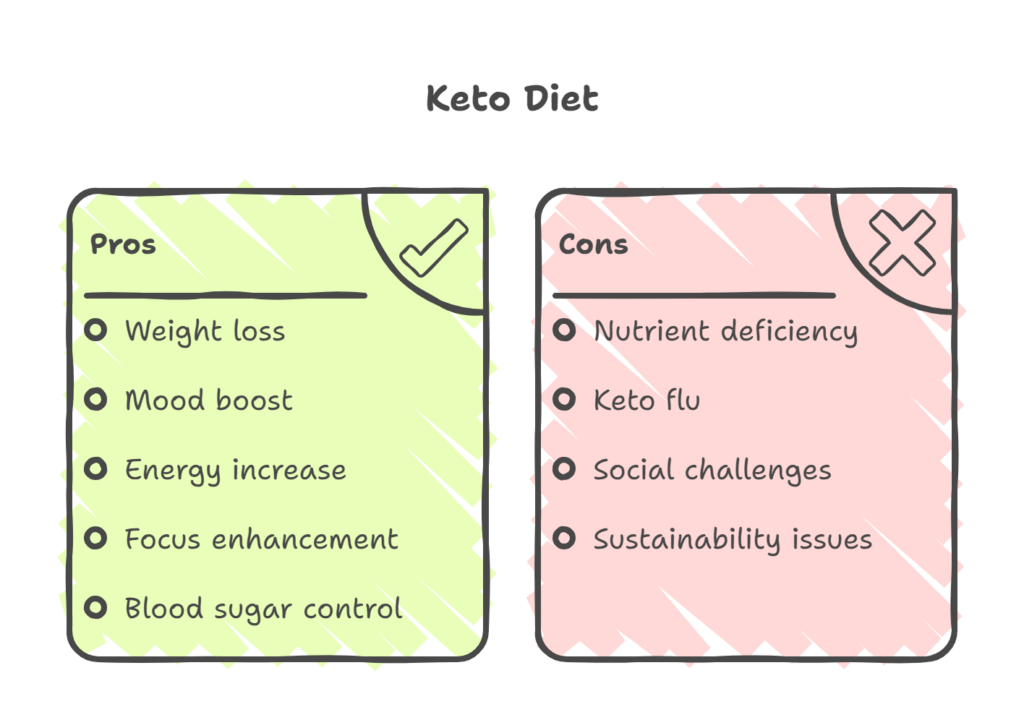A keto diet can enhance fat loss, especially when considered alongside a steroid cycle. It can also help preserve lean muscles, but it comes with certain risks. This blog will explore whether these benefits outweigh the risks.
Taking AASs (Anabolic Androgenic Steroids) and keto diets have both become popular in weight loss. However, can you mix them? Will that maximise your weight loss, or will it involve risks that you need to strictly stay away from? This post will attempt to answer those questions.
Understanding the Keto Diet
Before we begin understanding the pros and cons of combining a keto diet with AAS intake, it’s important to make sure that everything about a So, what is a Keto Diet?
The ketogenic or keto diet plan focuses on a drastic reduction in carbohydrate intake and replacing it with high-fat consumption. This leads to your body being put in ketosis. Ketosis is a metabolic state caused by your body primarily using fats as fuel instead of sugar and carbs.
What Are the Main Benefits of a Keto Diet?
The primary benefit of ketosis is weight loss due to stored body fat being used as fuel. It often leads to steady and rapid fat burning.
It also has additional benefits such as better mood, increased energy levels, enhanced focus, and better control of blood sugar levels. It is often suggested as a treatment for medical conditions, such as some types of cancer, Parkinson’s, and Alzheimer’s.
Thus, planning a keto diet can be stated as being effective for a variety of health benefits, especially as it holds the capability of speeding up the fat loss process.
Reduced consumption of carbohydrates and sugars also leads to stable energy levels, as well as reduced glucose and insulin content in the blood.

What Steroid Types are Considered in Cycles?
Generally, in terms of both fitness and treatments of certain conditions, two primary steroid types are considered to be taken in cycles: Anabolic Steroids and Corticosteroids.
Anabolic steroids are primarily used by bodybuilders and athletes to improve performance and build strength. They are notable for promoting muscle growth and improving tissue repair and regeneration rates.
On the other hand, corticosteroids are commonly used for medical purposes. They are the primary choice of medication in the case of inflammation control. Corticosteroids are also used to treat chronic conditions such as asthma, eczema, lupus, or even severe allergic reactions.
Differences and Why They Matter in Keto
So, what are the key differences between Corticosteroids and Anabolic steroids, and how do these differences matter when on a Keto diet? Let’s look at that with the help of the following chart:
| Aspect | Anabolic Steroids | Corticosteroids |
| Purpose | Muscle development, enhanced performance | Inflammation control and disease treatment |
| Common Side Effects | Hormonal imbalance, cholesterol imbalance. | Increase in appetite, weight gain. |
| Metabolic Influence | Increases metabolism rate while promoting lean muscle retention. | Weight gain, water retention |
Table 1: Anabolics vs. Corticosteroids
These types of steroids have a complex relationship with ketogenic diets. They can increase the blood glucose levels, leading to disruption of the natural order of ketosis. However, corticosteroids can also work positively with keto diets, like in the context of epileptic encephalopathies.
Anabolic steroids, on the other hand, have a more beneficial relationship with ketogenic diets. They can stimulate appetite, which is beneficial in interacting with the positive aspects of a keto diet. Therefore, you need not worry if you are on an AAS cycle when planning a keto diet.
How the Keto Diet Interacts with Steroids
From the previous section, it can be understood that anabolic steroids and ketogenic diets can have a positive relationship, while corticosteroids engage with keto diets in a more complicated manner.
Synergistic Benefits with AASs
Anabolic steroids and a ketogenic diet usually interact synergistically. A keto diet ensures low levels of water retention. This helps you maintain a higher level of muscle definition.
Also, a keto diet prompts your body to burn more fat as fuel. With this, your body can preserve as much muscle mass as possible. Furthermore, a fat-favouring diet is ideal for an AAS cycle, as it prevents the loss of lean body tissue, reduces fat percentage, and helps you retain muscle mass.
Moreover, as a fat-focused diet, keto also helps you maintain stable blood sugar levels. And in any anabolic steroid cycles, a high intake of saturated fats is promoted. This optimises the hormone production levels, meaning that you feel the maximum positive impact of the AAS on your muscle development outcome.
Therefore, the answer to “Can you do a keto diet on steroids?” is yes. This is especially true for bodybuilders considering AAS for increased muscle retention and fat loss.
Potential Conflicts with Corticosteroids
The working relationship between a keto diet and corticosteroids is, however, more complex. Primarily, it can be observed that corticosteroids are often in conflict with a ketogenic diet.
The first of those conflicts is that corticosteroid intake can increase blood glucose levels. And that can work against your keto diet by inhibiting ketosis.
That is why keto is often used when taking corticosteroids to counteract the weight gain aspects and for reducing insulin resistance. Therefore, the foods for the keto diet can be recommended on a corticosteroid medicine cycle to manage certain major side effects.
With all that having been said, is keto better for improving your body composition than a high-carb diet? And how is that affected by steroid intake? The following section will investigate the possible answers to this question.
Keto vs. High-Carb Diet For Body Composition
To see whether keto is more effective for body composition than high-carb diets, with or without AAS intake, let’s look at the following chart:
| Diet Plan | Steroid Use | Lean Muscle Gain | Fat Loss | Blood Sugar Stability |
| Keto | Yes | High | Very High | Stable |
| Keto | No | Moderate | High | Highly Stable |
| High-Carb | Yes | Very High | Low | Unstable |
Table 2: Keto vs. High Carb for Body Composition
From the chart, it can be effectively stated that with or without taking AAS, a ketogenic diet is more effective in gaining and retaining lean muscle mass, compared to a high-carb diet. Moreover, a keto diet is more effective in maintaining stable blood sugar levels, minimising muscle wasting, and retaining muscle mass.
Therefore, a keto diet while on a steroid cycle can be ideal, especially for improving muscle retention and effective body composition.
Potential Side Effects and Risks
While a keto diet can enhance the muscle-building effects of an AAS cycle, it is not completely smooth sailing, as there could be certain side effects that may occur. These potential risks include:
Before the risks are pointed out, there’s one important note to make. The note is that all of the side effects mentioned will occur in the case of unsupervised usage of steroids while on a keto diet. Thus, the first task to fulfil when considering the combination of keto and AAS intake will be to follow the recommendations of a physician.
The physician’s expert-level knowledge would be ideal in helping you maintain these practices within a level of moderation. With that being said, let’s look into the:
Risks of a Keto Diet While on a Steroid Cycle
An unsupervised intake of steroids while on a keto diet can lead to:
- Hormonal imbalance
- Potential liver damage
- Cardiovascular issues
And on the other hand, a Keto diet while on a steroid cycle can generally cause:
- Kidney strain due to excess protein formation
- Electrolyte imbalances
Who Should Consider or Avoid This Combination?
So, who should consider planning a keto diet while on an anabolic steroid cycle?
The list of potential candidates includes:
- Competitive bodybuilders, but only under strict medical supervision.
- Athletes looking to quickly lose body fat, also under medical supervision.
- Those who are looking to improve their hormonal profiles.
And who should avoid?
- Anyone without medical oversight.
- Those who are suffering from heart problems.
- People prone to kidney or liver issues.
Summing Up
A keto diet can complement an anabolic steroid cycle. However, it should only be considered under strict medical supervision. Without supervision, there could be risks involved, such a cardiovascular strain, hormonal imbalance, and electrolyte imbalances.
Looking for the Ideal Keto Diet Plan on a Steroid Cycle?
If you want to maximise your fat loss while also gaining lean muscle mass, you should look into the ideal combination of a keto diet plan and an AAS cycle. However, remember to always consult for medical expert before considering any combination.
Frequently Asked Questions
No. For muscle gain, it is generally recommended to take anabolic steroids. Corticosteroids are predominantly applicable for medicinal purposes.
Keto is primarily a fat-focused diet. Therefore, it promotes higher levels of fat-burning, which prevents water weight from accumulating, leading to lower water retention and less bloating.
It is usually not recommended that you plan your own keto diet and consult a physician. It is mandatory even when your steroid cycle is regulated.
As long as you avoid taking steroids at unregulated doses, and as long as your keto diet is regulated, the fat burning will, in fact, support your lean muscle retention.




